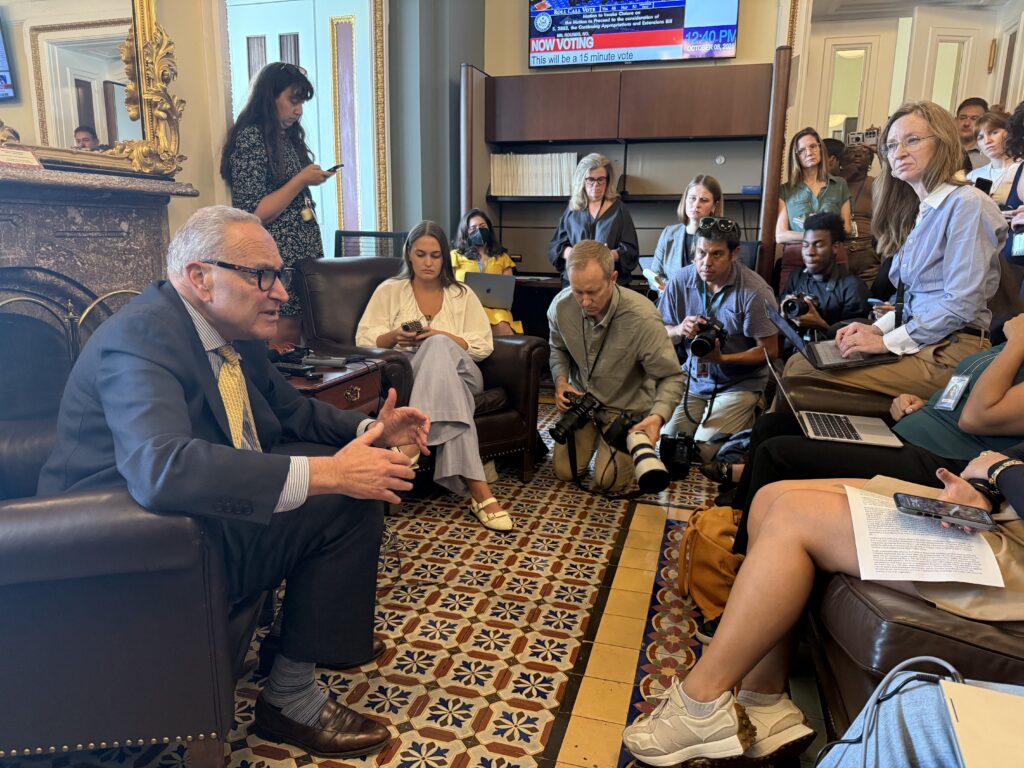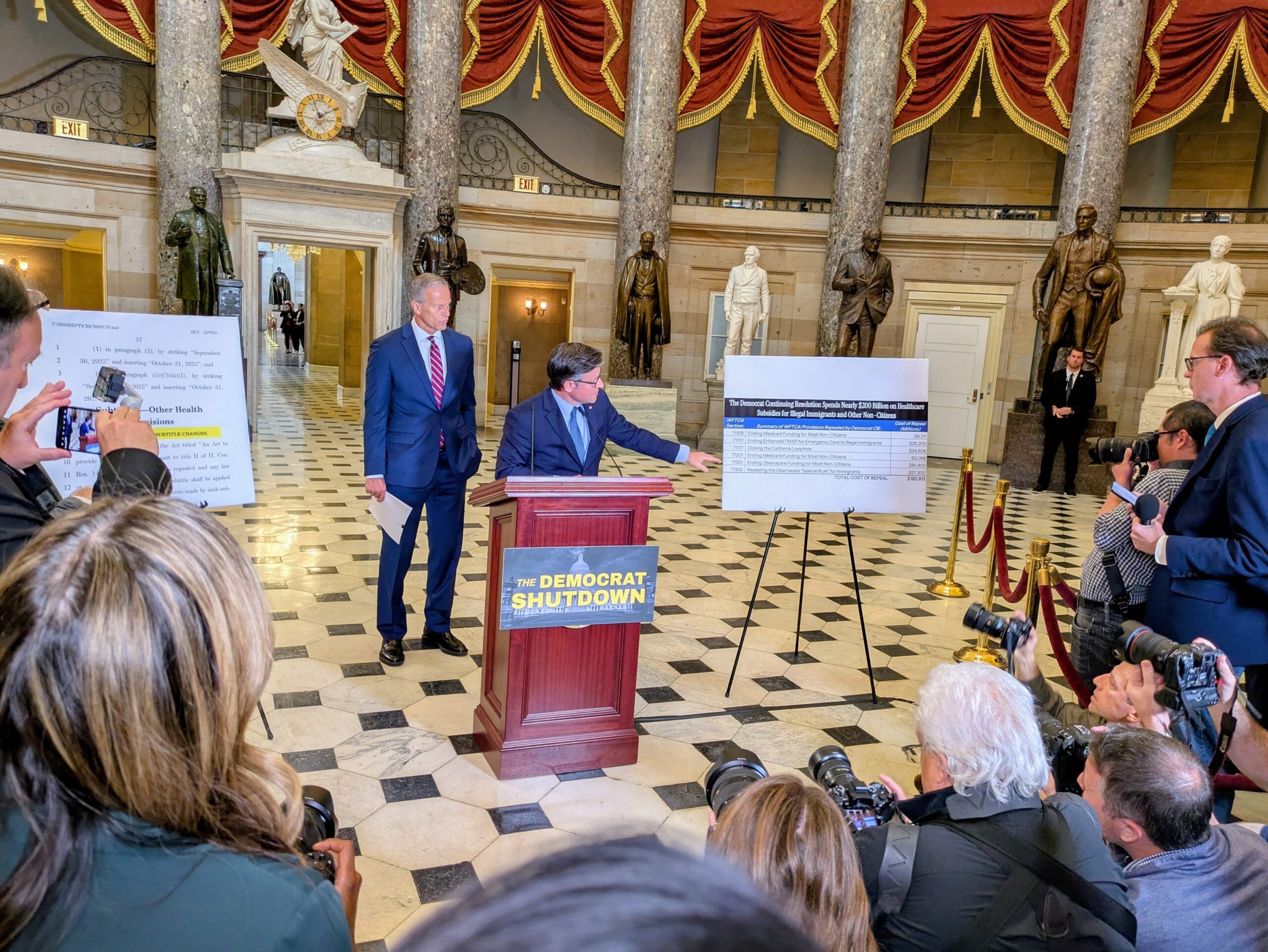
U.S. Senate Minority Leader Chuck Schumer, D-N.Y., speaks with reporters in the U.S Senate press gallery on Wednesday, Oct. 8, 2025. (Photo by Jennifer Shutt/States Newsroom)
This report has been updated.
WASHINGTON — Congress has just one week to break the stalemate and fund the government before active duty military members miss their first paycheck of the shutdown.
That would be followed later in the month by absent wages for federal civilian employees and the staffers who work for lawmakers — benchmarks that would traditionally increase pressure on Democrats and Republicans to negotiate a deal.
But both sides remained dug in Wednesday, as the Senate failed to pass Republicans’ short-term government funding bill for the sixth time and Democrats were unable to get the support needed to advance their counterproposal.
The 54-45 vote on the GOP bill and the 47-52 vote on Democrats’ legislation didn’t reach the 60 votes needed to advance under Senate rules.
Nevada Sen. Catherine Cortez Masto and Pennsylvania Sen. John Fetterman, both Democrats, as well as Maine independent Sen. Angus King voted with Republicans to advance their multi-week funding bill. Kentucky GOP Sen. Rand Paul voted no.
The shutdown began on Oct. 1, the start of the federal government’s 2026 fiscal year.
Trump warms up to idea of separate bill on military pay
Speaker Mike Johnson, R-La., rejected the idea of voting on a stand-alone bill to provide paychecks to active duty military members during the shutdown, saying that if Democrats wanted to ensure salaries for federal workers, they should vote to advance the stopgap spending bill.
“They live with that vote. They made that decision. The House is done,” Johnson said at a morning press conference. “The ball is now in the Senate’s court. It does us no good to be here dithering on show votes. We did it. We sent the product over.”
Trump, speaking from the White House later in the afternoon, broke with GOP leaders in Congress on passing a stand-alone bill to provide pay for military members during the shutdown.
“Yeah, that probably will happen. We don’t have to worry about it yet. That’s a long time,” Trump said. “You know what one week is for me? An eternity. One week for me is a long time. We’ll take care of it. Our military is always going to be taken care of.”
Johnson also appeared to fully reject an idea floated by the Trump administration not to provide back pay for furloughed federal employees, which is required by a 2019 law.
“It’s my understanding that the law is that they would be paid. There is some other legal analysis that’s floating around. I haven’t yet had time to dig into and read that,” Johnson said. “But it has always been the case, it is tradition and I think it is statutory law that federal employees be paid. And that’s my position. I think they should be.”

Trump muddied the waters on that issue during his afternoon appearance, blaming Democrats for how his administration plans to handle back pay for furloughed federal workers.
“We’re going to see. Most of them are going to get back pay and we’re going to try to make sure of that,” Trump said. “But some of them are being hurt very badly by the Democrats and they therefore won’t qualify.”
The shutdown will likely only end after congressional leaders begin talking with each other about core policy issues, including how to address enhanced tax credits for people who buy their own health insurance from the Affordable Care Act Marketplace. The credits are set to expire at the end of the year, spurring huge increases in health insurance costs.
Democrats say a deal must be reached before they’ll vote to advance the GOP stopgap spending bill that would fund the government through Nov. 21. Republican leaders maintain they won’t negotiate until after Democrats vote to open the government.
‘You can’t take the federal government hostage’
Senate Majority Leader John Thune, R-S.D., said he and other GOP lawmakers are willing to talk with Democrats about the tax credits, but only after the government reopens.
“They have other issues that they want to bring up, which I said before we’re happy to discuss, and yes, there are some things that I think there’s interest on both sides in trying to address when it comes to health care in this country,” Thune said. “But you can’t take the federal government hostage and expect to have a reasonable conversation on those issues.”
Thune said the stopgap funding bill is needed to give both chambers more time to work out a final agreement on the dozen full-year government funding bills, which were supposed to become law by the start of the fiscal year.
“What this does is provide a short-term extension in order for all that to happen,” he said. “That’s all that we’re talking about.”
Senate Minority Leader Chuck Schumer, D-N.Y., said Republicans are divided on health care issues and want to avoid a public debate over the Affordable Care Act tax credits.
Schumer then read part of a social media post by Georgia Republican Rep. Marjorie Taylor Greene in which she said she was “absolutely disgusted” that health premiums will double by the end of the year without action.
“More Republicans should listen to her because, on this issue, she’s right on the money,” Schumer said. “Meanwhile, Democrats’ position hasn’t changed. We urge our Republican colleagues to join us in a serious negotiation to reopen the government and extend ACA premiums.”
Trump threats
The shutdown’s ramifications will continue to get worse the longer lawmakers remain intransigent, especially given President Donald Trump’s efforts to differentiate this funding lapse from those in the past.
Trump has said he’ll lay off federal workers by the thousands, cancel funding approved by Congress for projects in Democratic regions of the country and may not provide back pay for the hundreds of thousands of furloughed federal employees.
Trump and administration officials have been vague about when and how they’d implement layoffs, but a federal judge hearing arguments in a suit brought by a federal employee labor union has ordered government attorneys to file a brief later this week detailing its plans and its timeline.
Northern District of California Judge Susan Illston has given the Trump administration until the end of Friday to share details of any planned or in-progress Reduction in Force plans, “including the earliest date that those RIF notices will go out.”
Illston, who was nominated by former President Bill Clinton, also told the Trump administration to detail what agencies anticipate implementing layoffs and how many employees that would impact.
Illston set Oct. 16 for oral arguments between the American Federation of Government Employees and federal government attorneys over AFGE’s request for a temporary restraining order to block the Trump administration from implementing layoffs during the shutdown.
Murkowski reports informal talks
Alaska Republican Sen. Lisa Murkowski, part of a bipartisan group that has begun informal talks, said during a brief interview Wednesday that the government must reopen before real steps can be taken on the ACA tax credits.
“I think the leadership has made very, very clear that the way to open up the government is, let’s pass a bill that will allow us to open up the government, and then there’s a lot of good conversations that can go on,” Murkowski said. “It doesn’t mean that we wait until then to start conversations, and that’s what we’re doing. We’re talking but we’re talking outside of the range of your microphones.”
She said, “There are not a lot of guarantees around this place, are there?” when asked by a reporter whether Republicans could provide Democrats with assurances on floor votes on ACA tax credit extensions if they vote for the stopgap spending bill.
North Carolina GOP Sen. Thom Tillis said he expects the shutdown to last for at least a couple more weeks and urged Democratic senators to vote to reopen the government.
“Go take a look at the list of Democrats who are either not running for reelection or not up until ‘28 or ‘30,” Tillis said. “There are plenty of them to walk the plank like I have multiple times to get the government funded and then the discussions start.”
Oklahoma Republican Sen. Markwayne Mullin said that talks between Democrats and Republicans are “stalled” but “we’re having conversations with everybody.”
South Dakota GOP Sen. Mike Rounds said that lawmakers have had bipartisan “visits” though no real conversations.
“There’s no framework,” Rounds said. “There’s just a matter of a clarification about how important it is to get the shutdown over with. And once we get that shutdown over with, we’ll go back to bipartisan work in the Senate.”
Ariana Figueroa contributed to this report.


![[Aggregator] Downloaded image for imported item #1156966](https://whitecounty.com/wp-content/uploads/2025/10/schumeroct82025-1024x768-1-696x522.jpg)

